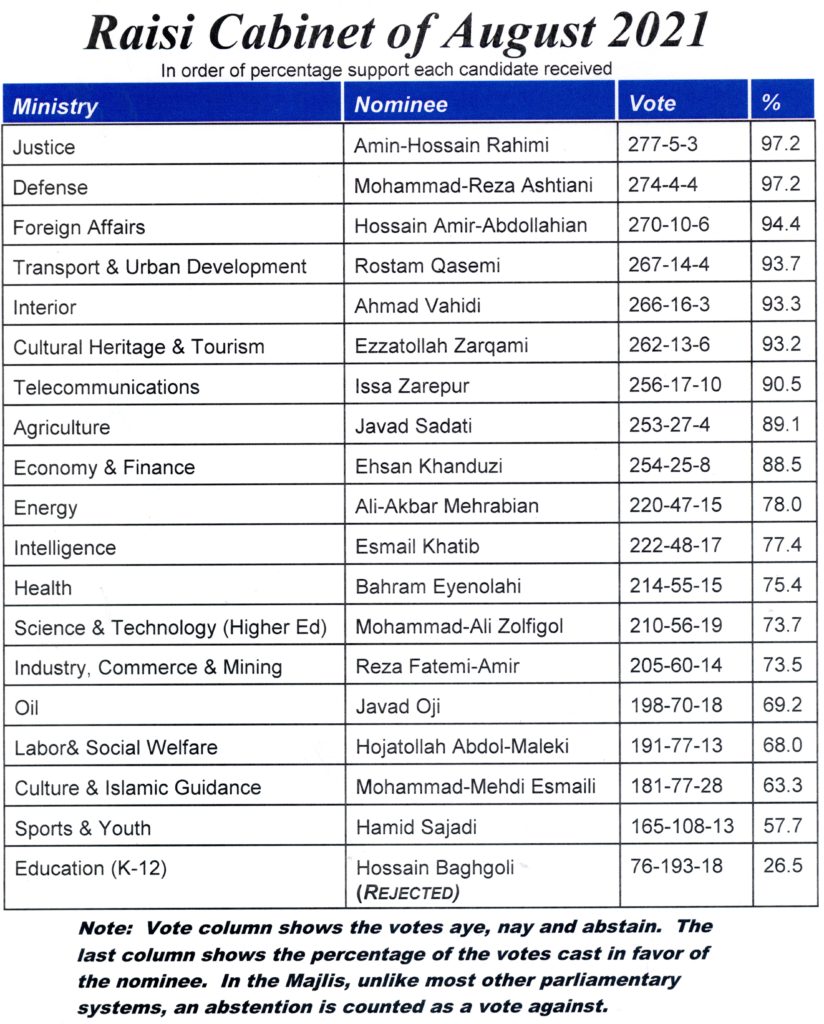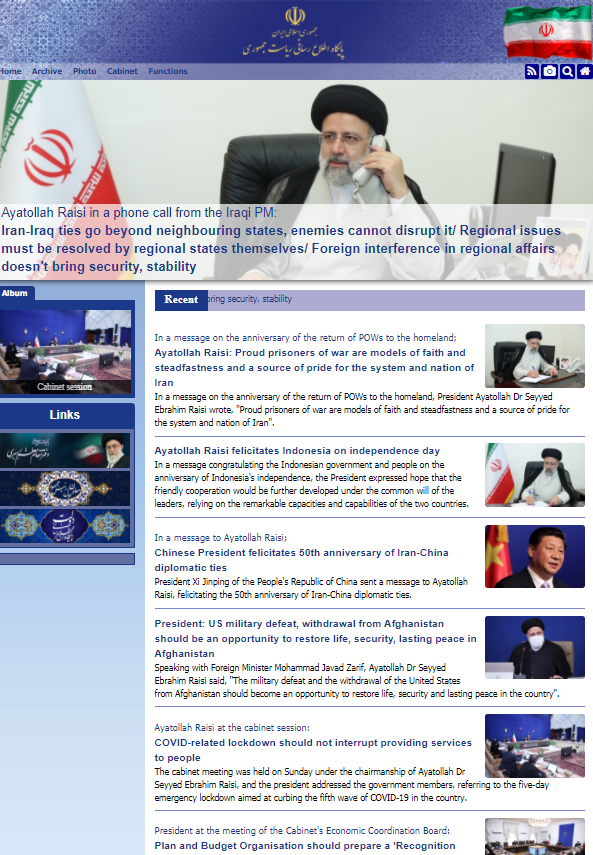September 3, 2021
 President Ebrahim Raisi has ordered that he be addressed in official documents as “Ayatollah Raisi” rather than President Raisi.
President Ebrahim Raisi has ordered that he be addressed in official documents as “Ayatollah Raisi” rather than President Raisi.
Even on the presidential website, he is formally addressed as Ayatollah Raisi. In later references, the article may say that “the president” did such-and-such, but each announcement begins by referring to “Ayatollah Raisi.”
Technically, Raisi has not completed the academic accomplishments expected of an ayatollah, but since the revolution the regime has been very loose with the term and tends to address all figures who rank high politically as ayatollah regardless of their scholarly standing.
Some speculated that Raisi wants to emphasize religious rank because he hopes to succeed Supreme Leader Ali Khamenehi as the next Supreme Leader. He may calculate that presenting himself chiefly as a religious figure rather than a political figure will help him in gaining the post when Khamenehi passes away.
The president started off his term in office by naming his first vice president, the man who actually runs the government on a day-to-day basis and who is widely viewed as something of a prime minister.
The norm is to name someone who is close to the president and can anticipate his needs, someone who is well known throughout the government and someone who has substantial administrative experience.
The new first vice president has much administrative experience—but otherwise seems an odd pick as he has never worked with Raisi and is not well known. He is, however, very close to Khamenehi.
The new first vice president is Mohammad Mokhber, who has served for 14 years as the head of the Office Executing Imam Khomeini’s Order, known as Setad in Iran, the agency that is one of the biggest commercial conglomerates in the Islamic Republic as it runs many of the enterprises that were taken over by the state after the revolution. He worked there directly for Khamenehi.
Mokhber, 66, who was born in Dezful, had administrative experience before taking over Setad, He was deputy governor general of Khuzestan province and chairman of the state-owned Sina Bank.
But many wondered why Raisi brought in a man who is close to the Supreme Leader but virtually unknown to the president. Some saw it as the Supreme Leader further extending the scope of his power by sticking his fingers directly into the day-to-day operations of the government for the first time.
Mokhber succeeds Es’haq Jahangiri, a highly respected Reformist who served in the post for all eight years of Hassan Rohani’s time in office.
Raisi has named Mohsen Rezai to be his vice president for economic affairs, a new post that appears intended to take over economic policy and dominate the Economy Ministry and the Central Bank. Rezai was the head of the Pasdaran throughout the Iran-Iraq War and for the last 24 years has been the secretary of the Expediency Council, which has been charged with analyzing broad policy issues.
Rezai has a doctorate in economics from the University of Tehran. Few believe he would have accepted the post if real power did not come with it.
Rezai will also be the secretary of the Supreme Economic Council, which comrprises the chiefs of the three branches of government and was created by Supreme Leader Ali Khamenehi as the ultimate voice on economic policy. With the economy being Raisi’s second priority (after the coronavirus), Rezai could be in a very sigbnificant post.
As his chief of staff the man who runs the presidential office Raisi chose Gholam-Hossain Esmaili. Esmaili, 56, is well-known to Raisi, having served as his spokesman the last three years while Raisi was the chairman of the Judicial Branch of the government.
Before becoming spokesman, Esmaili was the public prosecutor of Mashhad and the head of the Prisons Organization.
Raisi also appointed Masud Mirkazemi as vice president and chief of the Plan and Budget Organization. Mirkazemi, 61, was commerce minister during the first term of President Masud Ahmadi-nejad and oil minister during Ahmadi-nejad’s second term. Mirkazemi is one of many people closely associated with Ahmadi-nejad that Raisi has brought into the government, which has raised many eyebrows.
Raisi later named Moham-mad Eslami to head the Atomic Energy Organization of Iran. Eslami was a surprise for two reasons. First, he was transport minister under President Rohani and is thus the only Rohani appointee to be appointed to a post in the Raisi Administration. Second, Eslami is a civil engineer with no background in nuclear science. Previous chiefs of the Atomic Energy Organization have normally been nuclear specialists.
In one of his first policy decisions, Raisi appeared to be trying to curry favor with the media. He announced that he was canceling all the cases the Rohani Administration had filed against reporters. Of course, most of those targeted by Rohani were presumably supporters of the conservatives, including Raisi.























